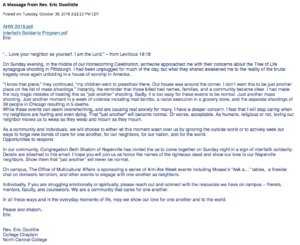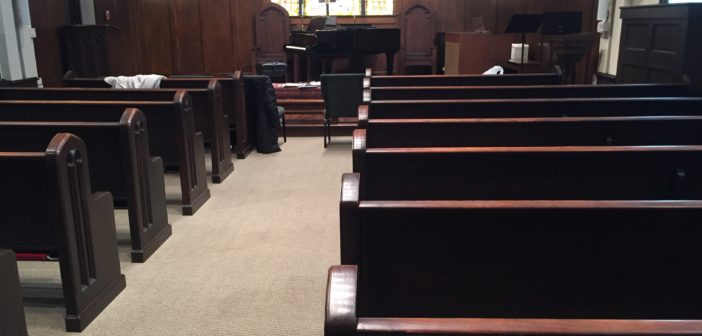America still has the freedom to practice religion, but do we have the freedom to do it safely?
Recently in America, hate crimes have drastically increased. USA Today reports that hate crimes have seen an increase in cities across the U.S. In California alone, the number spiked 44 percent between 2014 and 2017.
Hate crimes seem never-ending. The most recent example is the shooting at the Tree of Life Congregation in Pittsburgh, Pennsylvania. The shooter opened fire while shouting anti-Semitic slurs and killed 11 people in the process. The event has left the Jewish community in shock.
North Central College had an Interfaith Solidarity Event on Nov. 4 at Congregation Beth Shalom. The goal was to“bring together our neighbors in the spirit of respect and harmony, and united against hatred and bigotry in all of its forms.”
College Chaplain Eric Doolittle said that we have an ongoing challenge in our society right now regarding faith. Specifically, the question of safety for those expressing their faith and the overall status of religious expression in America today.
“The frightening part is that places of faith (are) seen as sanctuary… It comes out of the tradition that it is what a place of worship should be,” Doolittle said.
With the dramatic increase in the rates at which hate crimes are occurring, it begs the question of why this number is increasing at all.
According to Doolittle, there has always been a culture of oppression and hatred in America. We see it bubble up to the surface at different times and in different ways.
“For example, racism has never gone away, it just went underground,” Doolittle said. “What I think is happening right now is people feel empowered to express outwardly their feelings of hatred and bigotry that they have kept hidden in polite society for the last 30 or 40 years.”
In the last 30 or 40 years, a lot has changed. Politics and religion still seem to have an influence on each other. The Jewish community specifically has a long history of hate nationally as well as globally.
A 2017 Pew Research report, for example, notes that white evangelicals who are regular churchgoers are overwhelmingly supportive of Trump and his presidency.
Leslie Stopka, Catholic campus minister at the Office of Faith and Action, thinks of religion as a tool for politicians to utilize.
“I think politicians use and discard religion as it helps or hurts them,” Stopka said. “The freedom to practice your faith is crucial to the human experience and should remain part of our national dialogue. I think that political viewpoints get heated and hateful and that can trigger unstable people to do awful things and I think religion makes a good target.”
The instance in Pittsburgh was a man utilizing a gun to enact terror on a large group of people. However, Upasna Barath, ‘19, said we shouldn’t just dismiss it as an act of gun violence. While it is technically gun violence it is more specifically a hate crime against people performing Judaism.
“I think our current political climate is encouraging a lot of discussions and a lot of courage that people on both sides wouldn’t normally say. That courage is also being lit up in people who are dangerous and have dangerous opinions and thoughts,” Barath said
Political figures have an impact on religious thought. The discussion of praying in school and the role that religious thought has on policies like reproductive and marriage rights.
“The religious majority has decided that they want to work hand in hand with political leaders, but they want to do that in such a way that they impose their beliefs on other people,” Doolittle said. “They are trying to back the idea that everyone needs to pray in school and everyone needs to believe a certain thing… these concepts are a belief in Christianity combining with nationalism.”
Nationally, it appears that religion and politics aren’t as separated as the Constitution suggests.
The hate towards religion doesn’t create a divide between people and faith.
“I think that comfort is different from fearless. You can be comfortable being who you are, but today it’s hard to be fearless,” Barath said. “There’s always the idea of what will someone say to me or do to me in my place of worship.”
For NCC, interfaith is an important part of education and lifestyle. Doolittle sent out a message to everyone on Oct. 30 that expresses the need to connect and understand other religions, specifically in instances of tragedy. Doolittle said it was an effort to reduce the anxiety and stress surrounding these topics right now.

The constant increase in the number of hate crimes nationally begs the question: are we becoming a more hateful society?
For Stopka, it’s a complex question:
“It’s strange, but I think our culture is becoming much more sensitive and accepting of each other even while there are polarizing and divisive viewpoints saturating social media.”

